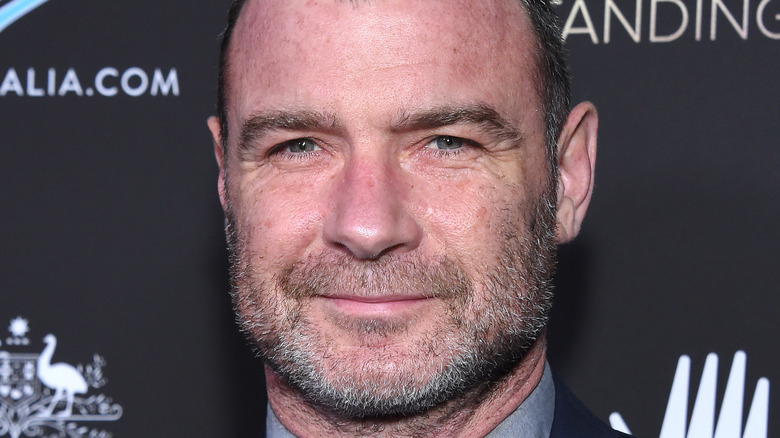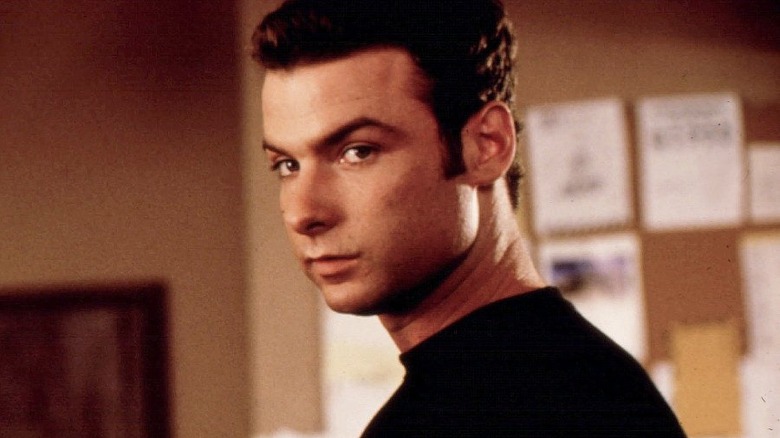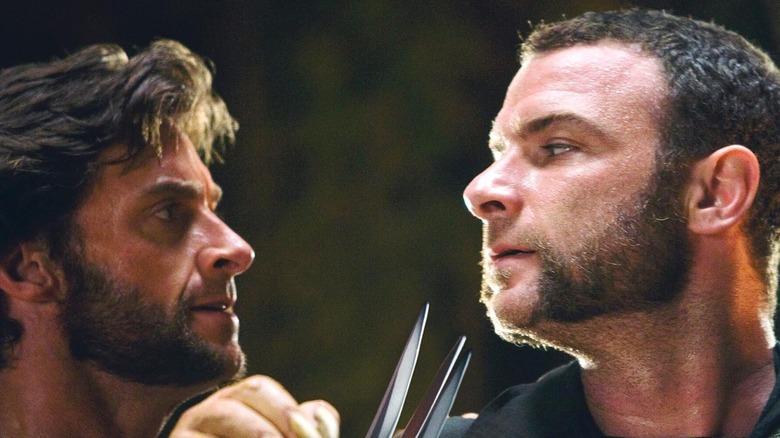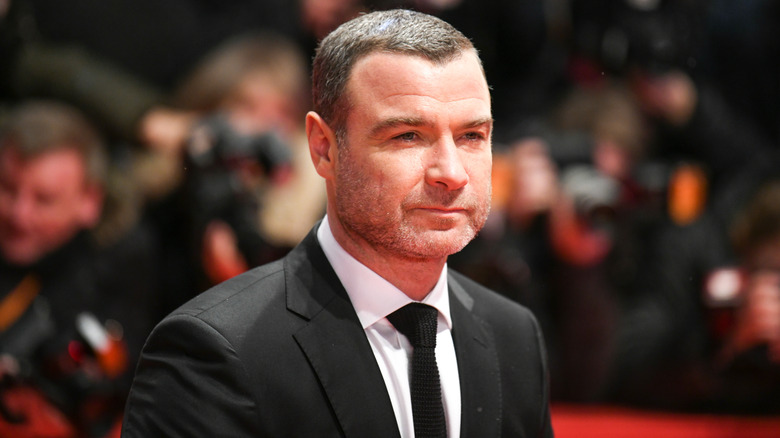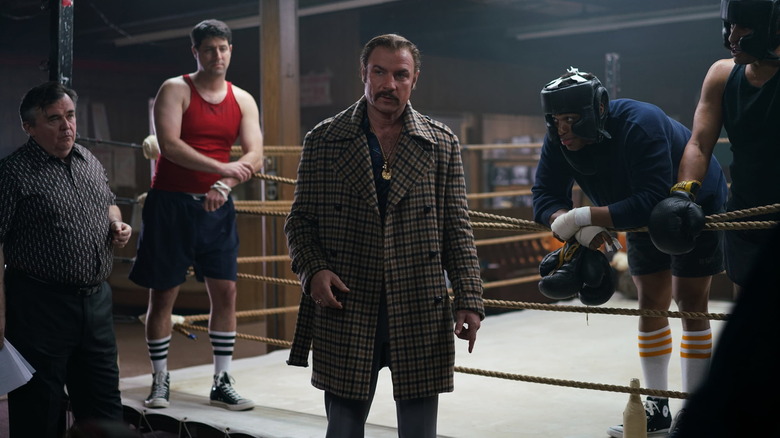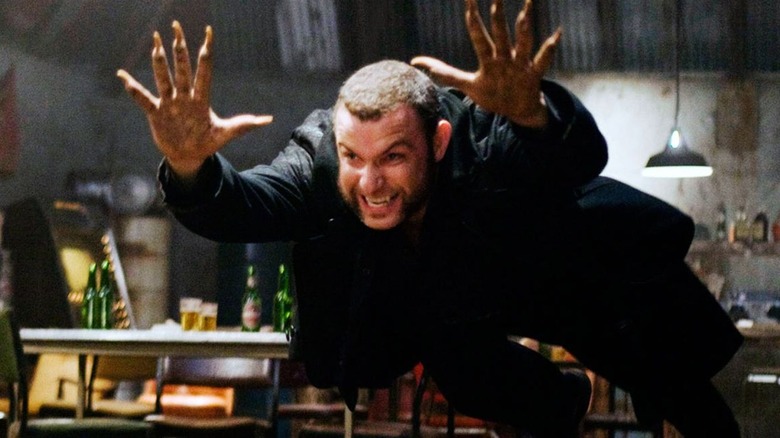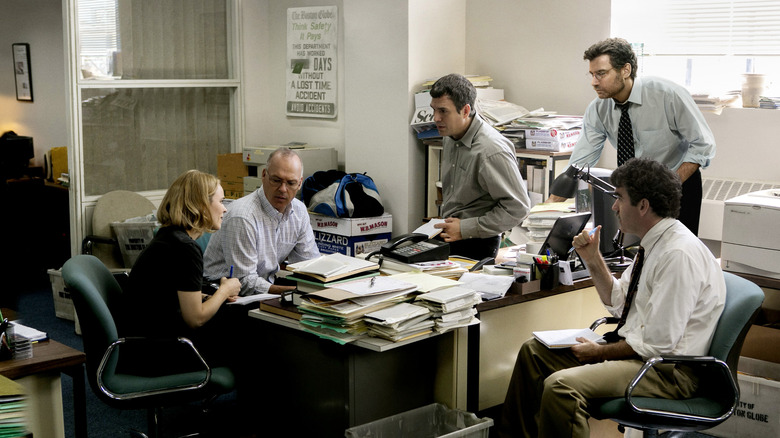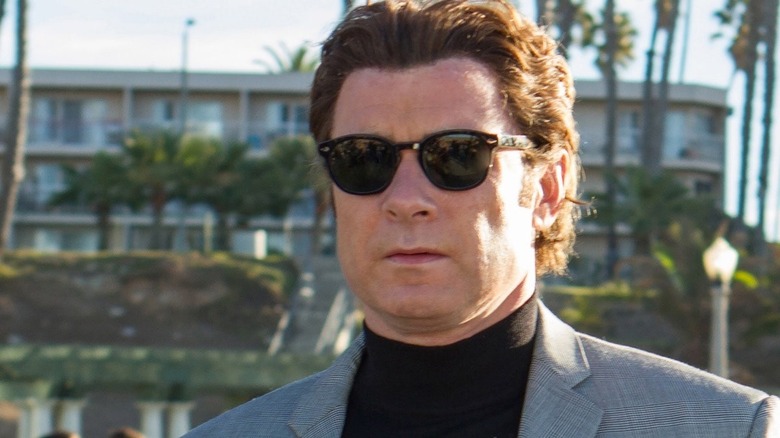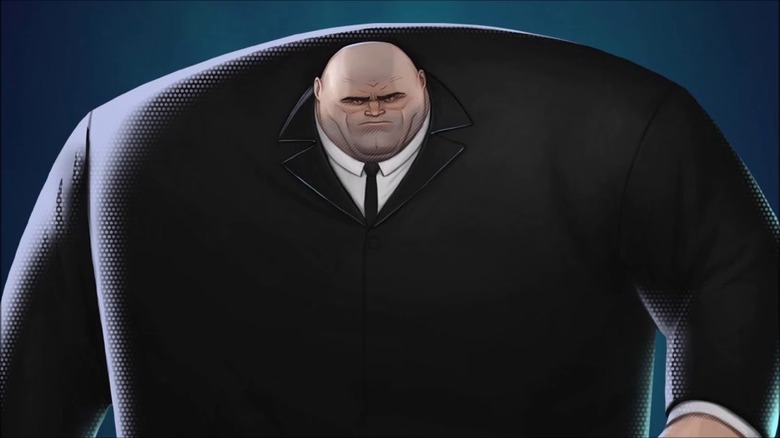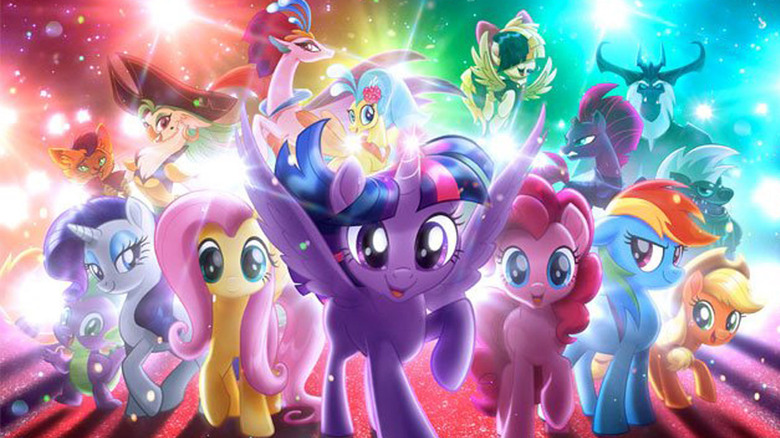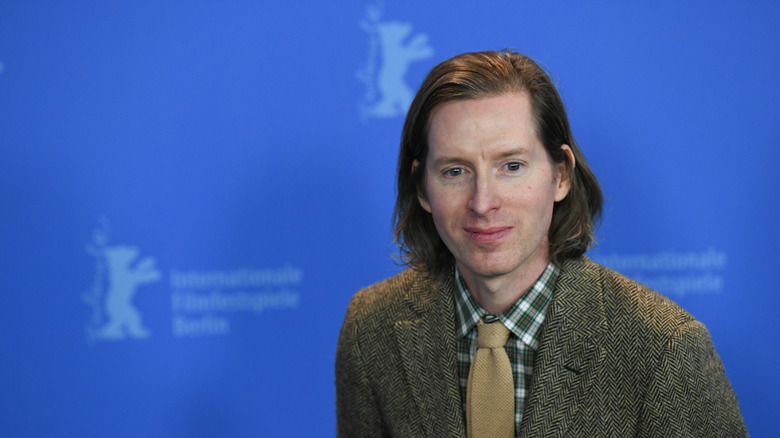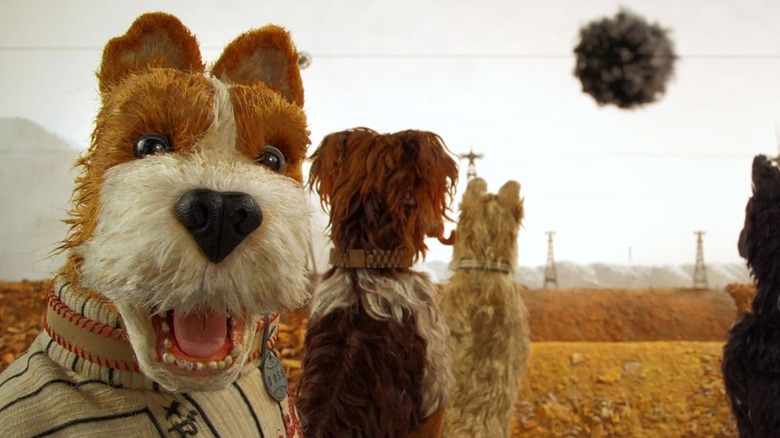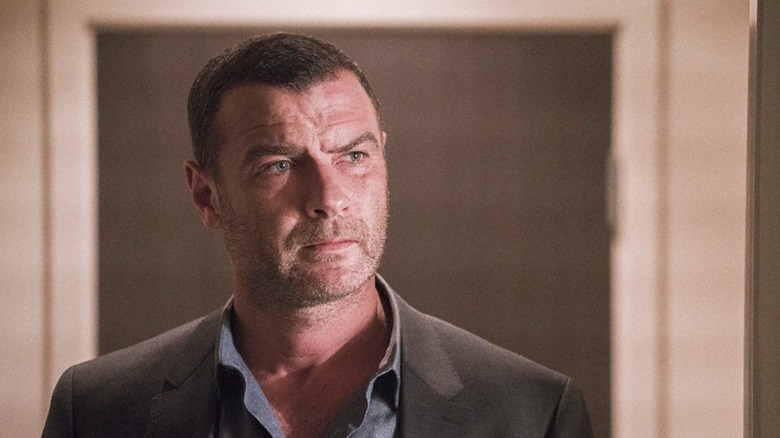The Untold Truth Of Liev Schreiber
If you've seen Liev Schreiber in a major movie, it's likely as some kind of tough guy meant to strike fear in the audience's heart. With his steely gaze and imposing frame, it's easy to imagine why Schreiber has become so in demand for these roles and he certainly plays them well. But if you've followed his career closely, it quickly becomes apparent that Schreiber can do so much more than just that. This is especially apparent in one of his best performances, as soft-spoken Boston Globe editor Marty Baron, in "Spotlight." It's a significant departure from prior Schreiber performances but his natural believability makes one wonder why we haven't seen Schreiber in more parts like this. Through stepping outside of his comfort zone, Schreiber found a role that accentuates his talents.
Throughout his lengthy filmography, Liev Schreiber has always been delivering those kinds of surprises. That level of unexpectedness is also present when exploring every nook and cranny of his career. From discovering why he initially joined the cast of the first "Scream" to why he took on roles in assorted animated kid's movies — to name just two scenarios — the untold truth of Liev Schreiber allows one to appreciate one of the most quietly complex actors out there.
Debt inspired the actor to join Scream
The "Scream" movies have become some of the most famous horror films of all time. For any actor now, the prospect of appearing in these features would seem like a no-brainer, the kind of thing actors would be tripping over themselves to join. But for the cast of the first "Scream," it was just another slasher movie. It was even less than that for Liev Schreiber, who briefly portrayed Cotton Weary — the killer of Sidney Prescott's mother — in the first "Scream."
"It was an auspicious beginning for me," Schreiber explained to Shortlist. "Bob Weinstein, who was a theatre fan, called me into his office. He said he wanted me to do this thing for him. I'm $70,000 in debt from student loans, and I'm looking for a job wherever I can get it. He says all he wants me to do is walk down some stairs and get into a police car. 20 seconds. 20 grand. I was like, 'I'm yours.'" Of course, "Scream" would become such a phenomenon that it spawned sequels, which would also involve Schreiber. "Then they fly me to Los Angeles first class. I just couldn't believe it," he said about "Scream 2." "Obviously it turned into a huge phenomenon, and they were kind enough to offer me a part in the second one." The surprise success of the "Scream" films yielded benefits for many, including Schreiber.
How Liev Schreiber approached playing Sabretooth
Superhero movies are quite common in the modern world but every performer seems to have a different approach to playing a character that originated from the world of comic books. This is especially true when you're taking on a part that's already been inhabited by another actor. For Liev Schreiber, who was hired to play the role of Sabretooth in the 2009 film "X-Men Origins: Wolverine," the task of portraying this character meant he had to incorporate a new vision of this villain that had already been played by Tyler Mane.
Luckily, Schreiber discovered his knack for portraying this character simply by embracing the heavy physicality of the part. "To do fight scenes with Hugh was really terrific," Schreiber told Superhero Hype. "Because as a dancer, he has that kind of discipline and choreography. And I always studied to be a fight choreographer, and always wanted to be a dancer too, but didn't quite have the feet for it. But we had some remarkable fight scenes together, and I'm looking forward to people seeing those." As for why he decided to jump onboard a big-budget superhero movie, that was pretty simple: "I don't think men really mature intellectually and emotionally beyond 22. Your bodies evolve, but nothing else, really. And so why should I stop wanting to be in a comic book movie?"
He has extensive experience with Shakespeare
Liev Schreiber's exploits as a performer are not just limited to the big screen. He's also got a notable track record as a stage performer, particularly when it comes to performing in adaptations of William Shakespeare's works. According to the Internet Off-Broadway Database, Schreiber spent much of the 1990s performing as various famous Shakespeare characters on the stage. Having acted in everything from "Henry V" to "Hamlet" to "Othello," Schreiber's acting credits in this section of his career start to resemble the list of required reading in an English literature syllabus.
For his constant work with the words of The Bard, Schreiber has garnered widespread praise. In a July 2003 review in The New Yorker, John Lahr highlighted his performance as the titular lead of "Henry V." "Schreiber is heaven-sent casting," Lahr praised. "At once compelling and unreachable, he has a swiftness of mind which convinces the audience that language is being coined in the moment. His speech, unlike that of the merely adequate supporting cast, feels lived rather than learned." With consistent acclaim like that, it's no wonder Schreiber has often returned to performing the beloved works of Shakespeare on stage.
Playing boxer Chuck Wepner was his passion project
The 2017 Liev Schreiber vehicle "Chuck" may not be an ultra-famous movie but it was certainly a project that the actor felt extraordinarily passionate about. In announcing that the production was first moving forward in October 2015, Deadline noted that Schreiber had been pursuing the opportunity to play Chuck Wepner for five years at that point. It would take another two for Schreiber's turn as "Chuck" to hit movie theaters.
As for what specifically attracted the actor to this man's life, it turned out it was the parallels Wepner's existence had with the modern world. "I kind of became more and more drawn to the kind of cautionary tale about celebrity and fame that seemed to be at the heart of Chuck's story," Schreiber explained to NPR. "I think we live in a sort of celebrity-obsessed culture. Somewhere in the past three or four years I remember hearing a young person say something like, 'I just want to blow up.' And that obsession with fame for fame's sake is kind of alarming to me. An obsession with celebrity for celebrity's sake is also — it's just strange, it feels, it feels unsafe. And there was something about Chuck's story that articulated that in a kind of simple but also entertaining and compelling way." Finding those relevant details in the story of the guy who inspired the movie "Rocky" provided easily understandable motivation for Schreiber's dedication to this role.
He almost returned as Sabretooth for Logan
"Logan" was the ultimate send-off to Hugh Jackman's version of Wolverine in countless ways. One additional manner in which the film, at one point, intended to wrap up the character's storyline was by bringing back Liev Schreiber's character Sabretooth, the half-brother of Wolverine, from the 2009 film "X-Men Origins: Wolverine." This would have been only the second appearance by Schreiber in the entire "X-Men" franchise, despite his final scene in the original "Wolverine" movie indicating that he still felt some kind of bond with his half-brother.
"As I recall, Jim [Mangold, director] had an idea where when they were on the run, and they go to the gambling town, there may have been at that point they were going to see [Sabretooth] for help," Hugh Jackman recounted to CinemaBlend about Sabretooth's proposed role in "Logan." "He was going to be there for help. Now that you mention it! I wouldn't swear to it, but we thought that would have been an interesting thing to do. And then for whatever reason we didn't do it." While Schreiber was eventually M.I.A. from the film, even the consideration of his character's return for "Logan" shows how detailed this project was trying to be in providing a fittingly rich finale for Jackman's mutant character.
Schreiber was concerned that Spotlight wouldn't work
Now that it's won the Academy Award for Best Picture, it's hard to imagine how anyone could have had hesitations about being a part of the cast for "Spotlight." But Liev Schreiber, who played editor Marty Baron in the feature, initially had his concerns about the film's screenplay.
"I thought it read really well as a book, actually. It had a literary quality and an attention to detail that was very rare," Schreiber said to Entertainment Weekly. "But I was worried about it as a film ... Because, you kind of hope that people still have appetites for that kind of story — as you also hope that people still have appetites for long-lead investigative journalism — but we all know that it's a very tough market for that." Luckily, not only did people show up to watch "Spotlight" in theaters but the film also connected with people to such a profound degree that it scored the ultimate Oscar gold.
He found speaking Russian for Pawn Sacrifice difficult
For the film "Pawn Sacrifice," Liev Schreiber was tasked with portraying Boris Spassky, the Russian chess rival to the film's protagonist, Bobby Fischer. To play the part, Schreiber would be entrusted to deliver the majority of his dialogue in Russian. Upon being asked by Entertainment Weekly if that was his decision, Schreiber responded, "Are you kidding? Why would anyone do that to themselves?"
"No, it was [director] Ed Zwick's idea," he continued. "He wanted to establish the dark, paranoid, Iron Curtain kind of vibe. He wanted to make Spassky as intimidating as possible, while also being as inscrutable and sort of 'Movie Star Russian' as possible. And speaking Russian the entire time was something that Ed thought we could use."
Though not something he would have come up with himself, Schreiber embraced the decision as one natural for the character. "I think people should speak their own languages in movies," Schreiber explained. "I mean, you have a character who is the personification of Russia — it's so rare that he would actually be speaking English." Understanding that added a lot of work for Schreiber but it also reflected his commitment to rendering his characters as people and not just broad caricatures.
Into the Spider-Verse's animation convinced Schreiber
Given how widely beloved "Spider-Man: Into the Spider-Verse" has become, there are countless reasons why any one of the film's actors would agree to join the production. After all, the comedy alone would be a lot of fun to tackle as an actor. Then there are the surprisingly intimate moments of poignancy, which could also be intriguing to embrace as a performer. For Schreiber, who voiced the feature's villain, Wilson Fisk/The Kingpin, it was actually the animation in "Spider-Verse" that convinced him to join this unorthodox superhero movie.
"It was actually the animation team," Schreiber said to Collider. "The guys who are working on it, I saw their work and said, 'Wow! These guys are special.' And it is ... they know what they want and they're clear, they've got all their sequences and their animatics, but you come up at them with a creative idea and they shift, they do it nimbly and with great execution." Anyone who's seen the groundbreaking animation on "Into the Spider-Verse" knows that these words from Schreiber are no pre-release PR hubbub. It's quite understandable that just a glimpse of those visuals convinced him to play The Kingpin.
Had personal reasons for doing My Little Pony: The Movie
Throughout his career, Schreiber hasn't shied away from tackling darker movies that confront challenging themes head-on. But nobody wants to do only heavy acting all the time, so it's not surprising that Schreiber has occasionally dabbled in lighter fare throughout his career. Case in point: Schreiber provided voice work for the 2017 kids film, "My Little Pony: The Movie," portraying the intimidating figure The Storm King.
If that sounds like a drastic departure from Schreiber's typical roles in movies like "Spotlight," well, that was the point. "My children don't really know what I do for a living," Schreiber explained to 89.3 KPCC. "I tell them that I'm an actor and that I play bad guys because I think the roles are more interesting. And they say, when are you going to do something that we can see? When the opportunity to play a role in the 'My Little Pony' came along, I thought, here's my chance to do something that my kids can see. And sure enough, I got the role of the arch villain in the 'My Little Pony' thing, so we'll see how that turns out." Nothing like the chance to impress your kids to help inspire a major career detour for an actor.
How Schreiber felt about working with Wes Anderson
The ensemble casts of Wes Anderson's modern movies have allowed a whole slew of performers a chance to work under the direction of this acclaimed auteur. This has included Liev Schreiber, who got to collaborate with the "Rushmore" director through providing voice work on the feature "Isle of Dogs." A self-professed fan of this filmmaker, Schreiber was excited to join the animated project, though he apparently wanted to spend even more time with Anderson.
"Yeah, I mean it was a shame that I only got to work with him for a couple of hours," Schreiber reflected to Collider. "That's how I felt, honestly. I was like, 'Oh wow! I get to work with Wes!' And I admit, as a filmmaker, there was a certain degree of espionage involved. I wanted to see his process, I wanted to see what he did. All I really got to do was hang out in a recording studio for a few hours." Schreiber still had a positive, albeit brief, experience with Anderson, and in the same interview he stated that he would be "thrilled" to become part of the director's stock players alongside Bill Murray and Jason Schwartzman.
The struggle to find Schreiber's right voice for Isle of Dogs
Certain animated movies demand a sense of zaniness in the vocal performances to match the similarly over-the-top sensibilities of the film they inhabit. But as Liev Schreiber discovered, Wes Anderson cartoons like "Isle of Dogs" go in another direction with what kind of voices the star-studded casts provide. This conscious choice reinforces the idiosyncratic spirit of Anderson's work, but it did prove a challenge for Schreiber when it came time for the actor to provide voice work as the character Spots.
"I knew that Wes wasn't looking for cartoon-y voices," Schreiber explained to Collider. "That's not what he does — and the kind of more idiosyncratic and humanist, and characteristic. You hear Bob Balaban's voice, you hear Jeff Goldblum's voice, you hear Bill Murray's voice — they're very distinct voices and there's no effort to mask who they are."
To match this approach, Schreiber just embraced his regular cadence. Though a challenge on an acting level, Schreiber did see this method as appropriate for the story of "Isle of Dogs." "I think that's conceptually the exercise," Schreiber said. "Is to give the animals real human attributes, and there's an irony implicit in that. There's also a slightly political idea at play there."
He sees Ray Donovan as a commentary on masculinity
For seven seasons, Liev Schreiber stepped into the morally complicated lead role of "Ray Donovan." This Showtime program never drew the ratings or worldwide acclaim of, say, "Breaking Bad," but "Ray Donovan" has proven to be an enduringly popular show in its own right. This is especially apparent in how its fan base was able to help inspire a TV movie finale for the program after it got axed.
Though the appeal of "Ray Donovan" fluctuates from person to person, Schreiber is compelled by what the titular lead of the show has to say about men. "In some ways, 'Ray Donovan' is about how difficult it is for a man — a grown man — in our society," explained Schreiber to Deadline. "Of course, this character was created by a woman, and the idea of what we as a society see as a real man is a completely prehistoric idea. And an arcane construct, if that really exists." Tackling that concept is a key reason why Schreiber has stuck with such a dark and complex character for so long.
